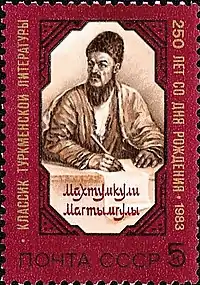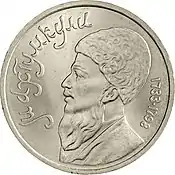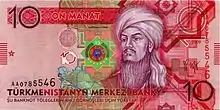Magtymguly Pyragy
Magtymguly Pyragy (Persian: مختومقلی فراغی Makhtumqoli Faraghi; Turkmen: Magtymguly Pyragy; Turkmen pronunciation: [mɑɡtɯmɡʊlɯ pɯɾɑɡɯ]; Turkish: Mahtumkulu Firaki;[20] c. 1724-1733 – c. 1807) was a Turkmen spiritual leader, philosophical poet, and sufi who is considered to be the father of the Turkmen literature[21] and the most famous figure in Turkmen literary history.[22]
Magtymguly Pyragy | |
|---|---|
 A Soviet Union stamp with an artistic depiction of Magtymguly Pyragy, 1983 | |
| Native name | مختومقلی فراغی |
| Born | Magtymguly c. 1724 or 18 May 1733[1][2][3] (sources differ) Haji Qushan, Khorasan, Safavid Empire[4] |
| Died | c. 1807 (aged 74-83)[3] Giňjaý, Akdepe (vicinity of the Etrek river), Khorasan, Qajar Iran[5] |
| Resting place | Aq Taqeh-ye Qadim, Golestan Province, Iran[6] |
| Pen name | Pyragy (Feraghi)[7] |
| Occupation | Poet, sufi[8] |
| Language | Turkmen, Persian, Arabic[9] |
| Nationality | Turkmen[10] |
| Alma mater | Idris Baba Madrassah, Gögeldaş Madrassah (Emirate of Bukhara), Şirgazy Madrassah (Khanate of Khiva)[11] |
| Period | Golden Age of Turkmen literature[12] |
| Genre | Poetry, qoshuk form[13] |
| Subject | Patriotism, social inequality, love[14] |
| Literary movement | Realism[15] |
| Notable works | Türkmeniň[16] |
| Spouse | Akgyz (disputed)[17] |
| Children | 2 sons[18] |
| Parents | Döwletmämmet Azady, Orazgül (disputed)[19] |
Many Turkmens regard Magtymguly's collected works as a pinnacle of Turkmen literature and are often found in the homes of Turkmen-speaking people, who learn his poems by heart and use them as proverbs and sayings. His life and poems have become the subjects of much analysis, commentary and interpretation, and have influenced post-18th century Turkmen writing more than the works of any other author.[23]
In a wider context, Magtymguly is often placed alongside major figures of the Turkic literary world such as Hoja Ahmad Yasawi, Yunus Emre, Ali-Shir Nava'i and Fizuli.[24]
Biography
Early life and education
Magtymguly is thought to have been born in Hajygowshan, a village near Gonbad-e Qabus city in the modern-day province of Golestan, Iran, the northern steppes of which are known as Turkmen Sahra ("Turkmen steppes"). In his poetry, Magtymguly says; "Tell those who enquire about me that I am a Gerkez, I hail from Etrek and my name is Makhtumkuli",[25] identifying his homeland as the banks of the Etrek River and expressing his identity through his tribe.[26]
Magtymguly received his early education in the Persian and Arabic languages from his father Döwletmämmet Azady, a leading Turkmen scholar. His mother's name was probably Orazgül, though this claim is not universally accepted.[27] Magtymguly studied in various madrassahs, including Idris Baba madrassah in the village of Gyzyl Aýak, Şirgazy madrassah in Khiva and "Gögeldaş" madrassah in Bukhara.[28][29]
Later life
After returning home, Magtymguly worked as a silversmith, and taught and wrote poetry.[30] He developed a realistic style of writing about 18th-century Turkmens that became very popular and led to him becoming one of the most cherished Turkmen poets of all time. He was a devout naqshbandi sufi who was said to have travelled throughout all of the lands comprising modern Turkmenistan, teaching and praying for the salvation of his people.[31] His strong religiosity and deep sense of spirituality are found in poems such as "Gaşy ýaý" and "Söýmüşem seni".[32]
Not much is known about Magtymguly's family life. He was unable to marry Meňli, the woman he loved, although it is thought he married someone else. Several sources state he was forced to marry and take care of the wife of his deceased brother Akgyz.[33]
Magtymguly's elder brothers Abdulla and Mahammetsupa disappeared, and his children died young. Magtymguly was also pained by the death of his father, with whom he had maintained close scholarly relations throughout his life.[30] Some of Magtymguly's poetry, along with stories collected from Turkmen oral traditions, suggest he was taken prisoner, likely in Mashhad, Iran. It is unknown who took him captive but such events were common in 18th-century Iran and Turkmenistan. A servant of the ruler, who was also a Turkmen, allegedly aided Magtymguly's escape.[30]
Magtymguly was buried in Aktokay, a village in north-eastern Iran.[34] The Iranian government has constructed a mausoleum on his grave.[35]
Political ideals

Magtymguly promoted the idea of keeping the Turkmen-way sacred and of maintaining the unity and integrity of the Turkmen nation. During his lifetime, his efforts had minimal success overcoming the existing tribal loyalties and rivalries.[36]
The Turkmen tribes of the 18th century were torn by internal violence and the aggression of powerful neighbors. Much of Magtymguly's poetry depicts the suffering of the common people caused by the selfishness of those in power.[37]
Magtymguly criticized rulers and religious figures for their exploitation of the poor and their mockery of justice in such stanzas as:
"Khans of Gokleng have been spoiled
They think we do not deserve any comfort
They took away all our belongings
We could not do anything but watch them"
and
"Rulers dispense no justice anymore
Muftis issue justice for a farthing."[38]
Poetry
Magtymguly was one of the first Turkmen poets to introduce the use of classical Chagatai, the court language of the Khans of Central Asia, as a literary language, incorporating many Turkmen linguistic features.[39] His poetry exemplifies a trend towards increased use of Turkic languages rather than Persian; he is revered as the founder of Turkmen poetry, literature and language.[40] Magtymguly is widely considered holy among Turkmen communities and his poems are often quoted as proverbs in Turkmen society.[41]
Magtymguly made much use of the qoshuk form of poetry, which features prominently in Turkmen folk songs and is easily adapted to Turkmen musical forms. The qoshuk form consists of quatrains with lines consisting of eight or eleven syllables, and follows a rhyming scheme of ABCB for the first stanza, and CCCB and DDDB for the following stanzas. The compatibility of Magtymguly's poems with traditional musical forms allowed them to be easily adopted by bakhshis (traditional singers).[42]
Magtymguly's first poem "By night when I was asleep ... Revelation" was composed following an incident that occurred when Magtymguly was a child. His parents were attending a wedding but Magtymguly was sleeping and they left him behind. As he slept, he began to foam at the mouth and his parents were called back to the house. When his father awoke him, Magtymguly recited his first poem.[43] Another of Magtymguly's poems recounts a dream in which Omar Khayyam bestowed upon him the gift of poetic invention.[44]
Magtymguly's poetry is often personal and takes up universal themes. His work includes elegies on the deaths of his father and children, the disappearance of his brothers, incitements to Turkmen unity, tirades against unjust mullahs and khans, praises of religious figures (such as the Twelve Imams), and laments at losing his lover to another man.[45]
On one occasion, Magtymguly's village was raided and his possessions, including poetry manuscripts, were carried away on a camel. The camel slipped, spilling the manuscript into the Etrek River. Upon seeing this, Magtymguly composed the following lines: "Flood took my manuscript, thus leaving me behind with tears in my eyes".[43] The poem also contains the lines:
"Making my dear life lost to all that's good,
An evil fate wrought awesome sacrilege,
Hurling the books I'd written to the flood,
To leave me bookless with my grief and rage."[43]
Although Magtymguly apparently recorded much of his poetry, none of the original texts are currently known. The existence of a few manuscripts is chronicled by scholars working under the Russian Empire. Following the 1917 Bolshevik Revolution, however, Soviet policy regarded texts written in the Arabic script as religious, leading to the destruction of many of his manuscripts. Many Turkmen who possessed manuscripts buried them while fleeing the Soviet Union to Iran.[46]
Türkmeniň
Magtymguly's most famous poem among the Turkmen people is Türkmeniň (of the Turkmen). The poem depicts the beauty of the Turkmen land, praises the valor and spirit of the Turkmen people, and calls for the unity of all Turkmens.[47]
The following is Magtymguly's "Türkmeniň" poem with the text transliterated into Turkmen (Latin) letters, whereas the original language is preserved. The second column is the poem's Turkish translation and the third one is its English translation.
|
Jeýhun bilen bahry-Hazar arasy,
|
Nehr-i Ceyhun Bahr-ı Hazar arası,
|
Between the Amu-Darya and the Caspian sea,
|
Legacy
June 27 is celebrated in Turkmenistan as "the Day of Workers of Culture and Arts and the poetry of Magtymguly Fragi".[49]
Monuments
Monuments to Magtymguly Pyragy are installed in cities across the former USSR, including Kyiv (Kiev), Astrakhan, Tashkent,[50] and Khiva, as well as in Iran and Turkey. A monument to Magtymguly made of concrete and natural stone was erected in Magtymguly Square on Magtymguly Avenue in the center of Ashgabat in 1971.[51]
Toponyms
- Magtymguly District is a district Turkmen: etrap in the Balkan Region of Turkmenistan.[52][53]
- Magtymguly is a city in far south-western Turkmenistan in Balkan Province, the administrative center of Magtymguly District.[54]
- Magtymguly is a zone in a gas and oil field in Turkmenistan.[55]
- Streets in Ashgabat, Nur-Sultan, Karshi, Tashkent, Turkmenbashy and Urgench, and a number of villages of Turkmenistan and former Soviet countries are named after Magtymguly.[56][57]
Institutions and organizations
The following are named after Magtymguly:
- Turkmen State University[58]
- Magtymguly National Institute of Language, Literature and Manuscripts[59]
- Magtymguly Musical and Drama Theater in Ashgabat.[60]
- Youth Organization of Turkmenistan[61]
- A library in Kyiv.[62]
Cinema
- Makhtumkuli (1968, producer Alti Karliyev) — the role was played by Hommat Mulluk.[63]
- Fragi - Razluchyonnyy so schastyem (1984, producer Khodzhakuli Narliev) — the role was played by Annaseid Annamuhammedov.[64]
Postage


In 1959, the USSR issued a postage stamp to mark the 225th anniversary of the birth of Magtymguly.[65] In 1983, the USSR issued another stamp to mark the 250th anniversary of his birth.[66] Turkmenistan issued a 10 manat banknote bearing his likeness in 2009.
Other
- In 1974, an orchestral composition by Veli Mukhatov was created "In memory of Magtymguly".[67]
- In 1992, the Magtymguly International Prize in the field of Turkmen language and literature was established.[68]
- In 2013, the composer Mamed Huseynov wrote an opera called "Monologues of Magtymguly Pyragy".[69]
- From 2002 to 2008, the month of May in Turkmenistan bore the name "Magtymguly".[70]
- In 2014, the Magtymguly Pyragy Medal was established as a reward for great achievements in the study, dissemination and promotion of the creative heritage of Magtymguly.[71]
- A Turkmen dry cargo ship is named "Magtymguly".[72]
See also
References
- "Baku marks 290th anniversary birthday of Magtymguly Pyragy". AzerNews. 17 May 2014. Retrieved 18 May 2014.
- "Participation of the delegation of Turkmenistan in the arrangements in honor of the 290th anniversary of Magtymguly Pyragy". Ministry of Foreign Affairs of Turkmenistan. Archived from the original on 17 May 2014. Retrieved 18 May 2014.
- "Magtymguly Fragi's biography". Medeniýet. Ministry of Culture of Turkmenistan. Archived from the original on 17 May 2014. Retrieved 18 May 2014.
- Imamkuliyeva, Irina. "Balkan velayat - a picturesque, fertile land with ancient history and distinctive traditions (AIMAG 2017)". Turkmenistan.
- Magtymguly, Selected Poems (in Turkmen). Ashgabat. 1941. p. 14.
- Magtymguly, Source of Inspiration (in Turkmen). Ashgabat: Turkmen State Printing Service. 2014. p. 132.
- Ashyrov, Annagurban (2014). Analysis of Magtymguly's Manuscripts (in Turkmen). Ashgabat: Turkmen State Printing Service. p. 33.
- Magtymguly, Source of Inspiration (in Turkmen). Ashgabat: Turkmen State Printing Service. 2014. p. 13.
- Ashyrov, Annagurban (2014). Analysis of Magtymguly's Manuscripts (in Turkmen). Ashgabat: Turkmen State Printing Service. p. 27.
- Magtymguly, Source of Inspiration (in Turkmen). Ashgabat: Turkmen State Printing Service. 2014. p. 23.
- "Magtymguly Pyragy". Gollanma, Information center.
- Geldiyew, G (2016). Edebiýat (Literature). Ashgabat: Ministry of Education of Turkmenistan.
- Ashyrov, Annagurban (2014). Analysis of Magtymguly's Manuscripts (in Turkmen). Ashgabat: Turkmen State Printing Service. p. 69.
- Ashyrov, Annagurban (2014). Analysis of Magtymguly's Manuscripts (in Turkmen). Ashgabat: Turkmen State Printing Service. p. 198.
- Magtymguly, Source of Inspiration (in Turkmen). Ashgabat: Turkmen State Printing Service. 2014. p. 14.
- Ashyrov, Annagurban (2014). Analysis of Magtymguly's Manuscripts (in Turkmen). Ashgabat: Turkmen State Printing Service. p. 213.
- Ashyrov, Annagurban (2014). Analysis of Magtymguly's Manuscripts (in Turkmen). Ashgabat: Turkmen State Printing Service. p. 332.
- "Magtymguly Pyragy". Gollanma, Information center.
- Magtymguly, Selected Poems. Vol. 1 (in Turkmen). Ashgabat. 1983. p. 26.
- Gudar, Nurcan Oznal (2016). Mahtumkulu Guldeste. Istanbul: Salon Yayinlari. p. 13. ISBN 978-605-9831-48-2.
- "Turkmenistan Culture". Asian recipe.
- Levin, Theodore; Daukeyeva, Saida; Kochumkulova, Elmira (2016). Music of Central Asia. Indiana University press. p. 128. ISBN 978-0-253-01751-2.
- Ashyrov, Annagurban (2014). Analysis of Magtymguly's Manuscripts (in Turkmen). Ashgabat: Turkmen State Printing Service. pp. 9–12.
- Gudar, Nurcan Oznal (2016). Mahtumkulu Guldeste. Istanbul: Salon Yayinlari. p. 11. ISBN 978-605-9831-48-2.
- Azemoun, Youssef. "The Significant History of Makhtumkuli and his Manuscripts." Journal of Makhtumkuli Studies 2(2000).
- Ashyrov, Annagurban (2014). Analysis of Magtymguly's Manuscripts (in Turkmen). Ashgabat: Turkmen State Printing Service. p. 188.
- Magtymguly, Selected Poems. Vol. 1 (in Turkmen). Ashgabat. 1983. p. 26.
- Azemoun, Youssef, trans. "An Interview with Gara Ishan". Journal of Makhtumkuli Studies 2(2000)
- "Magtymguly Pyragy". Gollanma, Information center.
- Azemoun, Youssef. “The Significant History”
- Gudar, Nurcan Oznal (2016). Mahtumkulu Guldeste. Istanbul: Salon Yayinlari. pp. 17–18. ISBN 978-605-9831-48-2.
- Ashyrov, Annagurban (2014). Analysis of Magtymguly's Manuscripts (in Turkmen). Ashgabat: Turkmen State Printing Service. p. 332.
- Рустамов, Эльдар (6 August 2020). "Трели соловья Хафиза и …поэзия Махтумкули" (in Russian). «Туркменистан: золотой век».
- "Magtymguly Pyragy". 8 July 2005.
- "Turkmenistan in the 16th and 17th centuries". New Ashgabat. New City, Old Traditions: 4.
- 1. Azemoun, Youssef. "Gara Ishan"
- Clark, Larry, Michael Thurman, and David Tyson. "Turkmenistan." Kazakhstan, Kyrgyzstan, Tajikistan, Turkmenistan, and Uzbekistan: Country Studies. Comp. Glenn E. Curtis. Washington, D.C.: Division, 1997. 318.
- Abazov, Rafis. Culture and Customs of the Central Asian Republics (Westport, Connecticut 2007) 89.
- Bakulin, F. “The Turkmen's Songs and Their Poet, Makhtumkuli.” Journal of Makhtumkuli Studies 1(1997).
- Azemoun, Youssef. “Pages From the Life of Makhtumkuli.” Journal of Makhtumkuli Studies 1(1997).
- Azemoun, Youssef. “Gara Ishan.”
- Bakulin, F. "Makhtumkuli."
- Azemoun, Youssef. "The Significant History."
- Azemoun, Youssef, "The Significant History."
- Ashyrov, Annagurban (2014). Analysis of Magtymguly's Manuscripts (in Turkmen). Ashgabat: Turkmen State Printing Service. p. 213.
- Gudar, Nurcan Oznal (2016). Mahtumkulu Guldeste. Istanbul: Salon Yayinlari. pp. 24–25. ISBN 978-605-9831-48-2.
- "Culture is the spiritual light of the people (in Turkmen)". Zaman Turkmenistan. "The proclamation of June 27 of each year as "the Day of the Workers of Culture and Arts and the poetry of Magtymguly Fragi" makes the workers of culture and art even more proud.
- На ул. Махтумкули в Ташкенте открыт барельеф поэта
- Big Soviet Encyclopedia (TU). Moscow. 1978. p. 28.
- "Districts of Turkmenistan". Statoids. Retrieved 24 May 2009.
- "OpenStreetMap: Districts in Turkmenistan".
- "Turkmenistan Presidential Decree No. 4066 of 4 June 2004" (PDF) (in Turkmen). 4 June 2004.
- "Turkmen State University named after Magtymguly (TSU)". University Directory Worldwide.
- "Magtymguly National Institute of Language, Literature and Manuscripts". Science of Turkmenistan.
- Magtymguly Musical and Drama Theater opens in Ashgabat.
- Library named after Makhtumkuli in Kyiv hosts creative anniversary evening of the poet.
- "Alty Karliev (in Russian)". Kino-teatr.
- "Fragi - Separated by happiness (in Russian)". Kino-teatr.
- Half a century of Soviet Turkmenistan (in Russian); Philatelist's calendar for 1974. М: Svyaz; October 21-27, 1973.
- "Postage stamp dedicated to Makhtumkuli (250 years)". Postage stamps of Russia, USSR and the World (in Russian).
- "Music born wıth poetry (in Russian)". Turkmenistan.
- "Zum 290. Jahrestag von Mahtumkuli Fragi (in German)". Turkmenistan-Kultur.
- "Turkmen Go Back to Old Calendar". BBC News. 24 April 2008. Retrieved 30 December 2016.
- https://en.trend.az/business/economy/2195182.html "The tender is for another docking and major repair of the Magtymguly dry-cargo ship of the Department of Trade Fleet of Turkmenistan".
External links
| Wikimedia Commons has media related to Magtymguly Pyragy. |
